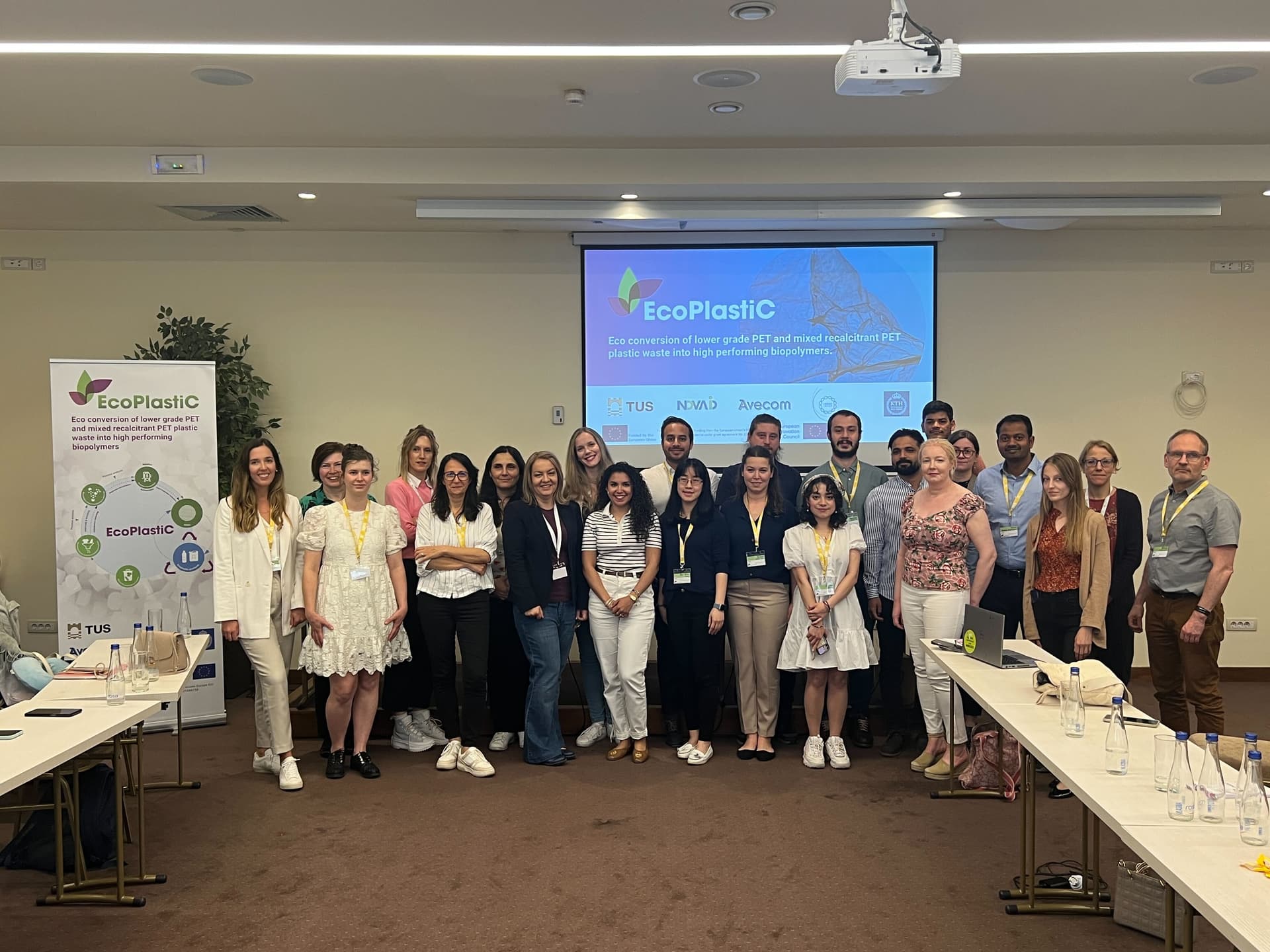EcoPlastiC General Assembly III

The third EcoPlastiC General Assembly (GA) took place on 17 May 2024 in Belgrade (Serbia). The GA provided an opportunity for all European partners from Ireland (TUS), Belgium (Avecom), Portugal (NOVA), Serbia (IMGGE) and Sweden (KTH)to meet in person, share the latest updates for each Work Package (WP), and discuss the future steps.
Within WP2 (Green depolymerization of mixed PET waste plastics), TUS presented their work focusing on the green depolymerization of mixed PET waste, including packaging and textiles. These green chemical processes were developed to achieve high PET monomer yields, even from challenging mixed PET streams such as metalized PET and textile waste. TPA (terephthalic acid) monomer which was produced met commercial specifications with yields over 99% and its thorough characterization confirmed its purity. Furthermore, BNC (bacterial nanocellulose) growth experiments using PET plastic waste hydrolysates achieved high yields. Finally, enzymatic degradation of PET-containing textile waste revealed the highest weight loss after 20 weeks using an enzyme cocktail mixture. These results highlight significant progress in sustainable PET waste management and bioplastic production.
Within WP3 (Design and optimization of the AVE microbiomes), AVE was testing complementary microbiomes under aerobic and anaerobic conditions. The samples obtained from TUS included REXed PET, REXed metalized PET and REXed metalized PET with low sodium. In the aerobic route, the conversion to PHA and/or protein rich biomass was carried out through different approaches: pure cultures and mixed aerobic culture. Several strains were selected based on TPA consumption and PHA accumulation, they were identified at IMGGE and two bioreactor runs were conducted. The next steps will include the optimization of TPA removal and protein rich biomass production. The mixed culture approach exhibits greater scalability, applicability and potential for industrial-scale operation. In the anaerobic route, the conversion to biogas using mixed anaerobic culture was carried out. Using the mixed aerobic sludge, it was concluded that a very long adaptation of seeding sludge was required (up to 3 months).
Within WP4 (Recovery of PHA), NOVA focuses on the selection of the best performing strain/community for scale-up trials at NOVA (10 L) and AVE (50 L). So far, all most promising strains/communities have good TPA removal capacity. For the optimization of the PHA recovery by green organic solvents, further testing is planned, where temperature, time, solvent to biomass ratio and anti-solvent will be optimized. At IMGGE, eutectic solvents are being used for successful PHB extraction and further experiments are underway. Finally, single and defined binary and tertiary mixes of enzymes were tested at IMGGE using wet and dried biomass containing both mcl-PHA and PHB, and the best performing enzymes will be evolved further.
Within WP5 (Processing and packaging prototype), KTH worked with 5 different biomasses which were used for production of films. In parallel, different types of microbial protein and PHA biomass samples were tested at TUS - all the films were prepared using extrusion, followed by compression molding for characterization. Blends of single cell protein (SCP), PHA-rich biomass, glycerol, polybutylene adipate terephthalate (PBAT) or polycaprolactone (PCL), polyhydroxybutyrate (PHB), polylactic acid (PLA) were tested at different ratios.
Within WP6 (Dissemination, Exploitation & Communication), IMGGE reported improved EcoPlastiC website analytics, increasing number of social media pages’ followers, better key performance indicators (KPIs), and announced the release of EcoPlastiC Newsletter #3 in December 2024, as well as organization of a ‘Women in science’ webinar.

Representatives from all partner institutions attended the GA:
TUS (Ireland) - Margaret Brennan Fournet (Coordinator and Team Leader), Laura Rodriguez Garcia, Catherine Collins, Marija Mojicevic (Project Ambassador), Bor Shin Chee, Cuneyt Erdinct Tas, Buket Alkan Tas, Eduardo Lanzagorta Garcia, Jeovan Araujo, Diana Garza Herrera, Muhammad Azeem, Necdet Ozcelik, Zeliha Ece Ozcelik
AVE (Belgium) - Helena Koninckx (Project Ambassador)
NOVA (Portugal) - Filomena Freitas (Team Leader), Patricia Concordio dos Reis (Project Ambassador), Cristiana Torres
IMGGE (Serbia) - Jasmina Nikodinovic-Runic (Team Leader), Jelena Lazic (Project Ambassador), Marija Nenadovic, Sanja Skaro Bogojevic, Jelena Milovanovic, Milica Ciric
KTH (Sweden) - Mikael Hedenqvist (Team Leader), Kiran Reddy Baddigam (Project Ambassador), Anna Svagan Hanner
The GA meetings and networking sessions take place twice per year, to enable direct communication amongst partners.